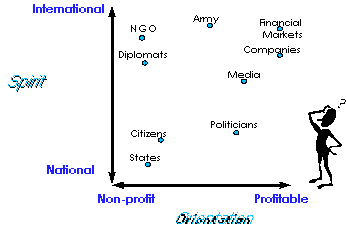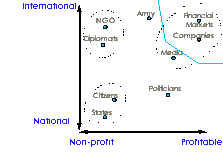 We can easily identify three
groups of actors that would be associated :
We can easily identify three
groups of actors that would be associated :Globalization :
Old Solutions for New Problems
In an early day of may Prof. Fukuyama declared :
"For any advanced industrialised society, there has been a kind of convergence. There is no higher stage of history (as the Marxist socialists used to argue) that will transcend the kind of bourgeois, capitalist, democratic civilisation that we know in the modern world"
Smith, Ricardo, Marx,... and many other trembled. We all agreed, but it made us think for a while.Eight months later while this idea was still running throw my mind when a letter from Germany stopped in my hands. Some crazy students were organising a conference on Globalization. I wanted to be there but... what could I say about such a difficult topic, would my thoughts be relevant in such a contest. I was hesitating to begin my essay when suddenly an idea came to my mind. My essay would be exactly what the organisation committee was asking for, I would just try to begin from ideal solutions to adapt them and make them possible. And here I am...
Every few hundred years throughout western history, a sharp transformation has occurred and it might be possible that in cultural and social terms more changes have occurred in the last 10 years than in the whole century. But it has probably been the fall of the Berlin wall the one that has made humankind reconsider the global order and the interaction of the different actors. If I had to make an exercise of abstraction in order to describe the current global arena my list of actors would only include a few relevant names like :

It is formed by the organisations with a pure economic mentality (of course, banks and media are all definitely included). Most corporations have forgotten Adam Smith's premise of social responsibility, instead, profitability is the name of the game. In this environment they feel comfortable because they have been the drivers of the Globalization process.
Diplomats (mainly international organisations) and NGO have the responsibility to be operative. Flexibility, innovation, creativity and agility are main requirements for these organisations. NGOs like Medecins Sans Frontiers, Amnesty International, etc... are taking part of UN's missions who sees how its own inefficiencies diminish their operativity. They have taken the traditional role of the religions who also lack in means and resources.
The passive elements group, would be leaded by citizens and the combination of the state and the politicians that do not have especial interest in supranational problems.
This global arena just described could be more illustrative including the path that each actor has described in the last fifty years. In a matter of decades, society altogether rearranges itself -its world view, its basic values, its social and political structures, its arts and also its key institutions. Then we would notice the evolution towards an adaptation of some actors like businesses (banking, consumer goods, even agriculture) but we could also see a lack of mobility and adaptation in more important actors like supra-national institutions and particularly United Nations.Globalization, as any social-change, has forced a discrimination between adapted and unchangeable organisations. Most governments have realised that international economic drivers are modelling national economic policies. Even more developed societies like the Nordics are reviewing the generosity of their welfare systems. Until we find a feasible "common accepted" alternative to the capitalism of modern democracies we will depend on the classical triad (land - labour - capital) and therefore be exposed to find solutions for problems such as :
Whenever a new problem appears and old solution is given ?

| Surname | Article | Magazine/Editor | Page | Date | Year |
| American Sociological Association | Contemporary Sociology | September | 1996 | ||
| BOECKELMAN, Keith | Federal Systems in the Global Economy : research Issues | Publius : The Journal of Federalism | Vol 26 Number 1 | Winter | 1996 |
| DOUGLAS, Susan & WIND, Yoram | The Myth of Globalization | Coumbia Journal of World Business | p 19-28 | Winter | 1987 |
| DRUCKER, Peter | The new society of organizations | Harvard Business Review | p 95-104 | Sept-Oct | 1992 |
| ESTEFANÍA, Joaquin | La nueva Economía. La Globalización | Temas de Debate | November | 1996 | |
| HANKE, Thomas | La politique économique, un concept a réinventer | Problèmes économiques | N. 2496 | Nov | 1996 |
| HIRST, Paul & THOMPSON, Grahame | Globalization in question : The International Economy and the Possibilities of Governance | Polity Press | 227pp | 1996 | |
| International Management Symposium | New realities - New Priorities | Conference Notes | May | 1996 | |
| LEVITT, Theodore | The Globalization of markets | Harvard Business Review | p 92-102 | May-June | 1983 |
| RAPKIN, David & AVERY, William | National competitiveness in a global economy | Lynne Rienner Publishers | 285pp | 1995 | |
| TAPSCOTT, Don | The Digital Economy | Mc Graw Hill | 346pp | 1996 | |
| WATERS, Malcolm | Globalization | Routledge | 185pp | 1995 | |
| YIP, George | Global Strategy... in a world of nations | Sloan Management Review | p 29-41 | Fall | 1989 |